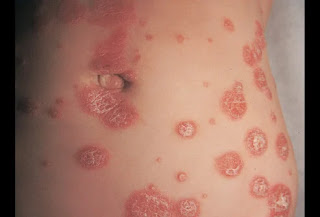Psoriasis is a skin disorder that causes skin cells to multiply up to 10 times faster than normal. This makes the skin build up into bumpy red patches covered with white scales. They can grow anywhere, but most appear on the scalp, elbows, knees, and lower back.
1- What is the main cause of psoriasis?
Psoriasis is caused, at least in part, by the immune system mistakenly attacking healthy skin cells. If you're sick or battling an infection, your immune system will go into overdrive to fight the infection. This might start another psoriasis flare-up. Strep throat is a common trigger.
2- Can psoriasis kill you?
Psoriasis is a chronic skin condition characterized by thick, raised red patches that are often covered with flaking, silvery scales. Although rarely life-threatening, it can dramatically affect a person's life.
3- What Does Psoriasis Look Like?
Psoriasis usually appears as red or pink plaques of raised, thick, scaly skin. However it can also appear as small flat bumps, or large thick plaques, ,. It most commonly affects the skin on the elbows, knees, and scalp, though it can appear anywhere on the body.
Pictures :
1- What is the main cause of psoriasis?
Psoriasis is caused, at least in part, by the immune system mistakenly attacking healthy skin cells. If you're sick or battling an infection, your immune system will go into overdrive to fight the infection. This might start another psoriasis flare-up. Strep throat is a common trigger.
2- Can psoriasis kill you?
Psoriasis is a chronic skin condition characterized by thick, raised red patches that are often covered with flaking, silvery scales. Although rarely life-threatening, it can dramatically affect a person's life.
3- What Does Psoriasis Look Like?
Psoriasis usually appears as red or pink plaques of raised, thick, scaly skin. However it can also appear as small flat bumps, or large thick plaques, ,. It most commonly affects the skin on the elbows, knees, and scalp, though it can appear anywhere on the body.
Pictures :
On average, patients whose psoriasis was diagnosed before age 25 did not live to age60. In contrast, a psoriasis diagnosis at age 25 or afterward was associated with an averagelife expectancy greater than 70.
Leave a comment , Thank you.
Tags
diseases







